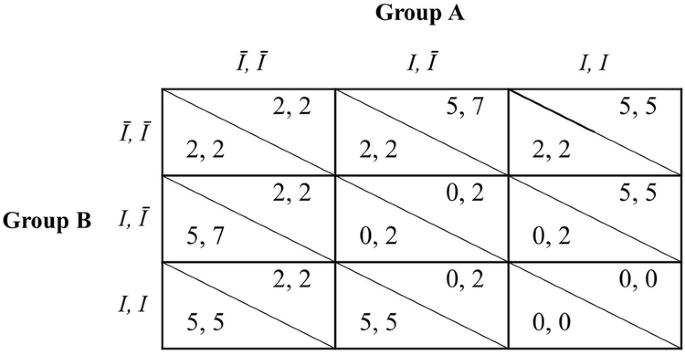Intranasal oxytocin interacts with testosterone reactivity to modulate parochial altruism
引用次数: 0
Abstract
The neuropeptide hormone oxytocin and the steroid hormone testosterone have received attention as modulators of behavior in the context of intergroup conflict. However, to date, their interactive effect has yet to be tested. Here, in a double-blind placebo-control design, 204 participants (102 female participants) self-administrated oxytocin or placebo and completed an experimental economic game modeling intergroup conflict. Salivary testosterone (n = 192) was measured throughout the task to assess endogenous reactivity. As a caveat, even at this sample size, our derived power to detect small effects for 2- and 3-way interactions was relatively low. For male participants, changes in testosterone predicted willingness to sacrifice investments for the betterment of the group. Intranasal administration of oxytocin strongly diminished this effect. In female participants, we found no credible evidence for association between changes in testosterone and investments, rather, oxytocin effects were independent of testosterone. This 3-way interaction was of medium to large effect size (Odds Ratio 5.11). Behavior was also affected by social cues such as signaling of ingroup and outgroup members. Our findings provide insights as to the biological processes underpinning parochial altruism and suggest an additional path for the dual influence of oxytocin and testosterone on human social behavior. A double-blind placebo-controlled oxytocin self-administration study in which male and female players of an economic game modelling intergroup conflict had their testosterone levels monitored, revealed that interactions between oxytocin and testosterone vary by sex.

鼻内催产素与睾酮反应性相互作用,调节狭隘利他主义
神经肽荷尔蒙催产素和类固醇荷尔蒙睾酮作为群体间冲突中的行为调节剂受到了关注。然而,迄今为止,它们之间的交互作用尚未得到测试。本文采用双盲安慰剂对照设计,让 204 名参与者(102 名女性)自我注射催产素或安慰剂,并完成一个模拟群体间冲突的实验性经济游戏。在整个任务过程中测量唾液睾酮(n = 192),以评估内源性反应。需要注意的是,即使样本量如此之大,我们得出的检测 2 向和 3 向交互作用微小效应的能力也相对较低。对于男性参与者来说,睾酮的变化预示着他们是否愿意为集体利益而牺牲投资。催产素的鼻内给药强烈削弱了这种效应。在女性参与者中,我们没有发现睾酮变化与投资之间存在关联的可靠证据,相反,催产素的影响与睾酮无关。这种三向交互作用的影响程度为中度到高度(Odds Ratio 5.11)。行为还受到社会线索的影响,如内群和外群成员的信号。我们的研究结果揭示了支撑狭隘利他主义的生物过程,并为催产素和睾酮对人类社会行为的双重影响提供了新的途径。一项双盲安慰剂对照催产素自我给药研究显示,催产素与睾酮之间的相互作用因性别而异。
本文章由计算机程序翻译,如有差异,请以英文原文为准。
求助全文
约1分钟内获得全文
求助全文

 求助内容:
求助内容: 应助结果提醒方式:
应助结果提醒方式:


